Alex Elle
Self-Care as Generational Healing
Alex Elle complicates the idea of self-care, opening it up as community-care, as a way towards generational healing. And she’s revivifying the meaning of meeting one’s “inner child” for a new generation. Our colleague Lily Percy says she could not have survived the physical isolation of the pandemic without Alex’s writing, teaching, and Instagram presence. So Krista hands over the mic to Lily for this conversation.
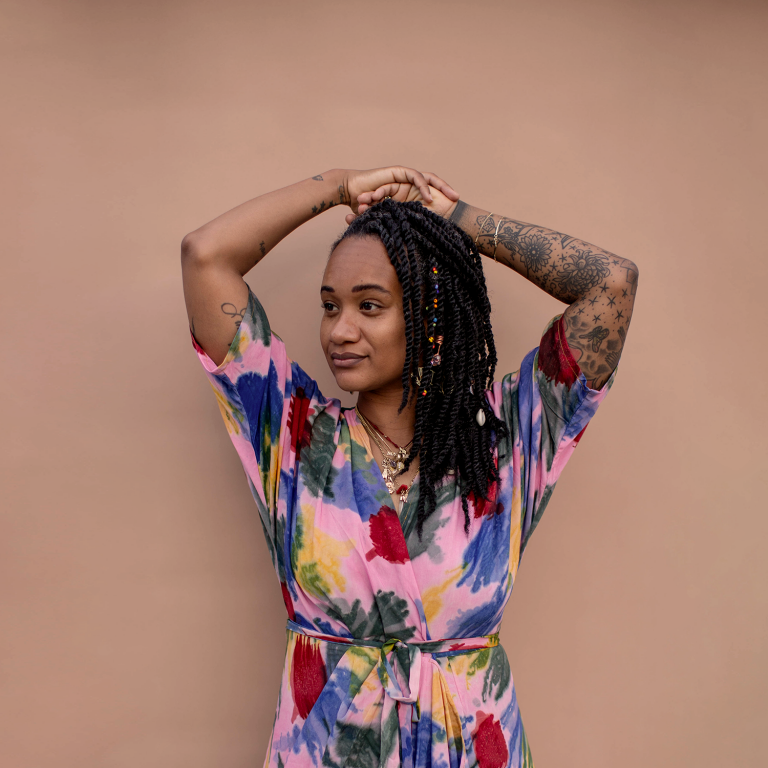
Image by Erika Layne, © All Rights Reserved.
Guest
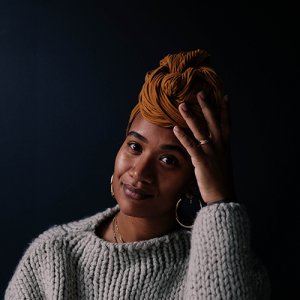
Alex Elle has a beloved presence on Instagram @alex_elle. She teaches workshops on “writing to heal,” and hosts the podcast “hey, girl.” Her books include After the Rain: Gentle Reminders for Healing, Courage, and Self-Love, Neon Soul, and In Courage Journal.
Transcript
Krista Tippett, host: I’ve been discussing with friends and colleagues how the last year has changed us — what it unsettled, what it deepened. My colleague Liliana Maria Percy Ruíz, who also goes by Lily, says she could not have survived the physical isolation of the pandemic without the writing, teaching, and Instagram presence of Alex Elle. For Lily, as a first-generation Colombian immigrant, Alex’s work opened up notions she had previously thought impossible and that have come to feel essential. She’d heard language like “self-care” and meeting your “inner child” and wasn’t sure what these meant or how to practically approach them. Were they for privileged people who have the time for this? So I’m handing the mic to Lily, this week, to interview Alex Elle. This conversation between them opens up self-care as community care and as a way to generational healing.
I’m Krista Tippett, and this is On Being.
[music: “Seven League Boots” by Zoë Keating]
Alex Elle has a beloved presence on Instagram, teaches workshops on “writing to heal,” and hosts the podcast hey, girl. Her books, including After the Rain, are treasured by many. Lily Percy is executive producer of On Being Studios and has also created and hosted the podcasts Creating Our Own Lives and This Movie Changed Me.
Lily Percy: Well, Alex, as I was sharing with you before we started recording, you have been such a source of support and comfort, and also challenge, in the best way during this past year. And so I’m just so grateful to be here with you and to have this space for conversation. So thank you.
Alex Elle: Lily, thank you so much. I really — like, I’m smiling ear to ear. And to know that my work has resonated with your heart really just makes me extremely happy, so thank you.
Percy: You know, one of the things that I find so remarkable about the way that you talk and write about self-care is just how much you describe it as a practice, which is something that I honestly have never really thought of before. And I’m just curious, when you think back to your childhood, what are your earliest memories of the idea of self-care or self-soothing, something else that you write about, as well? How did you see that modeled or not modeled, in your family or in your community?
Elle: So it was not modeled, and I think that’s where I learned it. And to be super transparent and clear, I didn’t start leaning into my self-care practices until I was in my early 20s. And that was really by way of force [laughs] from the universe, because I didn’t know who I was, and I was looking for other people to give me that answer. So when I started to toy with the idea of actually taking care of myself, it required me to get curious about myself, too, which I didn’t know how to do that, but I knew that I wanted to figure it out.
And I think that’s where curiosity came into play for me and my self-care becoming a practice, because I didn’t see anyone in my family taking care of themselves. I saw women breaking their backs. I saw women carrying the world on their shoulders and trying to raise families and trying to survive. And I just knew that that wasn’t going to be an option for me. So I decided to shift.
Percy: What was going on in your life at the time that really opened that up for you? And also — just as part of what I’m also thinking about — you know, self-care is kind of like this buzzword now that’s just thrown about, so I’m curious, as you think about that time when you first started to embrace it, what did it mean to you?
Elle: What it meant to me is showing up for myself so that I could show up for other people. And to put that in context, I became a mother at 18, so at 23, I was a young, single mother. And when my daughter was born, I vowed to myself that things would be different. I would be a different type of mother. I would be a different type of woman. And I would do my best to stop chasing love in places that were rejecting me.
And that required a lot of self-soothing, because rejection is a part of the human experience. And when I was in that early stage of figuring out what self-care meant for me, not only as a mother but as a woman, as a young woman trying to find her way and trying to dismantle generational cycles, I was really called to check myself and become more self-aware. And that’s really what self-care looked like, for me, is getting to know who I was and what that meant for my then one child — I have three children now — and also myself and my potential partner, which I’m married now. So everything really comes full circle, right, and it requires us to show up and get up close and personal with the things that really are uncomfortable. [laughs] And that’s what I learned, is self-awareness has to play a role in the self-care practice.
Percy: I so love the way that you complicate this idea of self-care [laughs] and the fact that you name self-awareness as being such a key component, because you write about that in your book After the Rain — that you’re flawed, like we all are, right? And you were learning some hard lessons that needed to be learned, but a lot of it was from not being self-aware of who you were and your actions at the time.
Elle: And using that as an excuse to not learn to do better, right? So I talk about that a lot in After the Rain and in the first chapter, called “Change,” which is everyone’s favorite chapter, where I talk about transitioning from working a 9-to-5 almost nine years ago now, to being in my career, to how much I was an awful employee at one point, to how I stepped into really being a great employee and then faced some really challenging issues with my then-boss. And it really shows the duality of self-awareness, from where I had grown from and where I was going. And I think change plays a big role in my life because I’ve had to change so much, and I’ve gotten really comfortable with being more OK with change and with learning that I always have work to do.
And I think that’s a part of being a student of life, is knowing that we will continue to expand and hopefully learn and grow until, you know, the day we transition off this planet. And I think that that’s extremely valuable and important, especially as a Black woman in this work and in this world.
Percy: I think reading that first chapter, one of the things that I remember feeling in my body was like, oh my God, I can’t believe Alex is sharing all these things — like the kinds of things that I would normally try to hide, the things that I think often prevent us from changing, which is not embracing both the best and the — I won’t say “worst,” but more complicated parts of ourselves. [laughs]
Elle: Yeah, and I like that you bring that up, because I was raised to hide. I was raised — and not necessarily — no one was telling me to hide. But children watch the adults in their lives, and just by watching the behavior of the people in my life who were my caretakers, I was taught very early on to hide, to be fearful, to be unhappy. And as I think back to my childhood, which I talk a lot about in After the Rain, it’s very tender, for me. I’ll be 32 this year, and I feel like each year I grow older, the more tender my childhood trauma is, for me.
Percy: Isn’t that amazing that that’s true? I relate to that a lot. I’m 39, and I’m still deeply surprised and disappointed by that. [laughs]
Elle: Yeah. Yeah. Oh my goodness, yeah. And I’m like, why am I feeling so tender about this now? Right? And I think that goes back to the self-awareness. There’s just a — I’ve found a new sense of self-awareness in my 30s, and I’m like, oh, so we’re doing this. OK. So we have to peel back some more layers here.
But it’s interesting, what those triggers have taught me and how raising three daughters in a loving home, in a nurturing home, in an honest home, in a home that encourages them to show up as their best and most beautiful and most flawed and messy selves, it just reminds me that there’s the lesson — that I didn’t have to continue the cycle of trauma and hurt and fear; that me and my husband can dismantle that for our daughters. And I think that really shows me that I’m not just mothering them, but I’m also mothering myself.
Percy: Yes, in the process. Yeah, I mean, you interviewed your grandmother on your podcast, hey, girl — I love the way you have it in the beginning, “hey, girl.” [laughs] And I was struck by so many of the things that the two of you talked about, but one of the things that just gutted me was when your Nana, which is what you call her, she said self-care was taboo for her growing up and even, it sounds like, for much of her adulthood. And it sounds like she’s still even kind of coming to terms, and she’s learning it through you. And I’m so curious, because she helped raise you, largely, what has that relationship been like for you now, as someone who’s kind of taken on this self-awareness and this self-care in your life? How have you been teaching your Nana to do that in her life?
Elle: You know, she’s in her 70s. And to hear her speak about what self-care looks like for her now, in this stage in her life, is really magnificent for me. And what I heard her say in that episode about how she can call a friend and speak with her friend —
Percy: During the pandemic, no less, because she was describing that experience of feeling isolated. And I will say, actually, that made me cry, because I live alone, and during this pandemic that’s been one of the hardest things to experience. And I sensed in her this — she said these words about feeling punished by God. You know, she’s a person of faith, as am I. And I also had those feelings, like, “I’m a good person. What did I do to deserve this?” And when she said those words, I was like, oh, Nana.
Elle: I’m getting teary just hearing you speak about that because, you know, she lives alone; as you said, she’s single, she’s unpartnered. And she told my mom that she never thought her life would end up this alone, this lonely.
Percy: That’s so hard.
Elle: And something that I heard her say in that interview is, community is really sacred to her. She doesn’t use that language, but that’s what I heard her say. So with that, we’ve done our part to protect ourselves so that we can protect her, as far as COVID goes, and having her over to be with her great-grandbabies gives her a lot of joy. And I remember when we started seeing each other again during COVID and quarantining for two weeks to make sure that we’re safe to be around her, and just all the care we had to take, for her and for ourselves, really spoke volumes about what self-care really is. And it’s an act of community care and community service.
So that is what I teach, not only her, but hopefully everyone who encounters my work, is that when I speak about self-care, I’m not just talking about the self. I’m also talking about how far-reaching being cared for internally is to our external communities, and I’m so glad that Nana just looks to me to see what self-care is, and also that she’s made her own definition of what it is and what makes her feel good. And it’s really — it’s really a beautiful thing, especially because she didn’t grow up like that at all.
[music: “Alustrat” by Blue Dot Sessions]
Tippett: I’m Krista Tippett, and this is On Being. Today, writer and teacher Alex Elle, in conversation with Lily Percy.
[music: “Alustrat” by Blue Dot Sessions]
Percy: You know, I love how you’ve described self-care as community care. And I’m just really curious to hear you unpack what that phrase means to you, because I don’t think it’s something that we often think about, right? And also, just how does that self-care as community care tie into your own celebration of your Blackness? In the chapter called “Identity,” in After the Rain, you talk about this a little bit, but I’d love to hear you share more.
Elle: Oh man. So self-care as community care, for me, is the filling up of self so that we can pour into others and not be depleted. So as I mentioned earlier, I watched my grandmother do this, I watched my mother do this, and so on and so forth. So deciding that, wow, that’s — for me, that is not how I want to move through the world. I don’t want to pour into anyone with my last drop and then have nothing left for myself, because then when it comes time to give again, I’ll have nothing. So essentially, it’s this refueling. It’s this reconnecting and realigning with the self so that we can show up intentionally.
That’s the key word for me, is “intentionally” and on purpose. And as a Black woman in this world and in this work, I think often folks who identify as women, we are always kind of taught at a young age to be the strong one and caretake, be it from a mothering standpoint or even from taking care of siblings or taking care of our parents. And we’re supposed to do that with a smile on our face, with nothing in our cup, and gladly.
And I am dismantling that, as a Black woman from my lineage, because I want my three daughters to look and say — to look at me and see the permission that they don’t have to do that. They don’t have to be tired. They don’t have to be broken-down and worn down.
And I was talking to my mom — yesterday, actually. We were having a pretty tender conversation, which — we are rebuilding, we have been rebuilding our relationship for the past, I would say, five years. And it’s actually really awesome because we can look at each other now as women, and not mother-daughter, but women …
Percy: As women.
Elle: … which changed the game for how we interacted with each other, which is a whole ’nother thing. [laughs]
Percy: Oh yeah. I love how you write about your relationship with your mother, truly.
Elle: [laughs] Oh man. But we were speaking, yesterday, and I told her that I didn’t feel like I came from a loving home. And she was saying how that’s really heartbreaking for her to hear, but she also understands. And she said, “It’s hard to feel like you come from a loving home when all the women in your life were just trying to survive. All you saw was survival. You didn’t see joy.” And I was like, whoa. We are having a breakthrough moment here.
And when I think about the healing that I’m doing and that I’ve been doing for the past eight years, the intentional, deeply rooted healing, I think about — even though it’s hard as hell. It’s like, gosh, why are we doing this? It’s so much easier to not. I think that’s why people don’t.
But choosing to do this hard —
Percy: Until it catches up with you, that’s the thing.
Elle: Right. Right, and then it knocks you down.
Percy: I speak from my own experience, as someone who avoided myself for like 30 years. [laughs]
Elle: Exactly. Exactly. Yes. [laughs] I can relate to that so much, and choosing to do this hard work, for me — and I don’t know if you can relate to this — but it doesn’t just heal me, it heals my lineage. And I speak about that a lot, how this is intentional soul work, how everything I put into the world as an author and as a facilitator and as a human and a woman and a Black woman, I want it to give other people permission to heal themselves so that they can heal their lineage — and not only so they can heal their lineage, in addition to healing their lineage, because that’s what it does. That’s what our intentional healing does, you know?
And I was speaking with someone about motherhood recently, and I was saying, it is so hard to be the matriarch of healing in your family.
Percy: Oof. [laughs]
Elle: It is so hard. And every time I try — I don’t really try anymore, because what’s the point? But — because it’s meant for me, to do this work, so there’s no way I can like, avoid it.
Percy: Exactly. There’s no trying, there’s just doing, now, for you. [laughs]
Elle: [laughs] Right, exactly. I was going to say, whenever I would try to avoid this work, it would be like, girl, where you going? [laughs] You don’t — no, come here. Come here.
And that’s how I knew that this work that I’m doing is so much greater than me. And for someone — and I bring that up because for so long, I thought my life didn’t have purpose. I was still — trigger warning: self-harm — I was still trying to kill myself, at 19, 20. So this work that I’m doing is intentional, everyday soul work, because for so long, I did not want to be on this Earth, and I did not think I had value. And that comes from lots of childhood trauma and pain, and choosing: you know, trauma doesn’t have to be my resting place. That is my mantra: Trauma is not your resting place.
[music: “Coyita” by Gustavo Santaolalla]
Tippett: After a short break, more with Alex Elle.
[music: “Coyita” by Gustavo Santaolalla]
I’m Krista Tippett, and this is On Being, today with Alex Elle, interviewed by my colleague Lily Percy. With her books, Writing to Heal workshops, and an influential Instagram presence, Alex Elle teaches and models self-care as community care and work of generational healing.
Percy: This paragraph in a chapter that just completely gutted me and changed me, [laughs] in your book After the Rain, it’s called “Soothing the Suffering.” And I’ll just — I’ll read this paragraph to you.
“I’d worked so hard to identify ill feelings stemming from my childhood and hush them so they wouldn’t be a distraction in my present-day life. I thought I’d put those issues to rest. So to have them rush back into my memory and take over my entire day made me doubt everything I thought I knew about the work I was doing on myself, everything I thought I’d healed from. In my mind, I had arrived already. I’d done the work it took to address things that triggered me. And I was frustrated that I was second-guessing what I knew to be true about myself.”
And then I love where you go here, because you describe what you said in a conversation with a friend: “Why can’t there be a destination in this self-healing work? Why does it have to be an ongoing process?” [laughs] “I told her I was looking for an end point. Trying to figure this stuff out over and over again made me feel like time was being wasted.”
That paragraph, I remember putting my book down when I read it, because that is so often how I feel — like, this is such a waste of time. How have I not progressed further? Why am I still dealing with the same issues? [laughs]
Elle: Oh my gosh. [laughs]
Percy: But reading your writing gave me so much hope, because — particularly in this chapter, I’d never thought of the concept of self-soothing as a practice that you could do, not as a weakness or something associated with babies. I always — like I have a niece, and my sister-in-law talks about teaching her to self-soothe. I always thought of it as something as — you know, weakness and something childish. And I never thought about it as something that could be a tool that I could use every day, and that I needed to use it in order to live and enjoy life and have both pain and joy in my daily life.
Elle: And that duality is major — like, that both/and, that “I am; and still” “I can; and still” is huge. It’s huge for me, it’s huge for — [laughs] for my process. And self-soothing — it’s interesting that you brought up your niece, because I was the same. And I’m like, self-soothing is for babies. It’s when you’re sleep training. It’s when you’re weaning off the breast. It’s like, it’s these things, right? It’s when they don’t have a pacifier. It’s like, all these big things that are, for babies, huge, that keeps them alive and that teaches them skills, kind of, early on. And I’m like, my adult self needs to learn how to self-soothe, [laughs] because …
Percy: Yes. I mean, how much better would our work lives, our personal lives be, if people just would figure out how to self-soothe? This is what blew my mind, Alex, after reading this. [laughs] We’re all just a bunch of babies, looking to self-soothe. [laughs]
Elle: [laughs] Yes, and then I also think about just the inner child work I’ve been doing. And I often tell my students that our inner child is us. So our adult self and our younger self are still us, and we still — it doesn’t matter how old we are today, we still need that love and care and inner peace and these tools to help us move through the world. This world is stressful. This is a stressful world. And my journal is my mirror, my loved ones are my mirror, so whenever I can’t see myself, I know who I can look to and what I can look to for a reflection, right? And that also offers me self-soothing, because I can see myself how other people are seeing me, just through their affirmation and their reminders; like, “You’ve done so much healing and so much work. Don’t discredit that.” You know?
Percy: Yeah. Yeah. I love, too, because what you’re talking about there is something that you name in your bio, which I love this language you use — that you’re an author and a “writing to heal” facilitator; the fact that you see writing as a healing process. I’d love for you to talk a little bit about that, because that’s something that you’ve really cultivated intentionally and deeply on your Instagram account — alex_elle — [laughs] which is just such a beautiful community that you’ve formed there. And it’s not just because it’s huge — it’s over 1.1 million people that are following you on there, and I’m part of that community — but because of the intentionality and the thoughtfulness that goes into that. And one of the things that you’re most known for is these “notes to self.” And I’m curious for you to talk a little bit about using writing as this tool for healing and how that note to self began for you.
Elle: So I found writing to heal in therapy when I was 19. I had this really awesome therapist named Miss B., and she’s the first person to give me permission to know myself. So, long story short, I was working with her for some months, and I loved her. And she gave me this imaginary emotional toolbox, and she told me to put a journal in it. And I’ve always been a writer — poems, longform — I loved writing, but I never thought about writing to heal. I always thought about writing to vent or writing to recap, but not necessarily writing to heal myself.
Percy: Yeah, to process, to analyze, but healing is such a fascinating concept.
Elle: And I did not start sharing my work until I was 22, maybe. I might’ve been 21. And Instagram was very new, and I started sharing my notes to self there. And the reason why I started sharing on the internet is because a friend of mine told me to stop hoarding my story and hoarding my happiness.
Percy: Wow.
Elle: She was like, “You’re healing. You’ve done so much healing, and you are not alone. And you don’t know who needs your story.” And I’m like, “Girl, nobody cares.” And she was like —
Percy: [laughs] I want to thank that friend personally. You just let her know.
Elle: [laughs] I will— I will tell her this. And she was like, “Oh no. Somebody cares. And even if it’s one person, that’s one heart changed.” I will never forget that.
Percy: I’ve been in — lucky enough to have been in therapy since my mid-20s, on and off. And every therapist has tried to have me do inner child work. And I’ve just really dug down and be like, “Nope. Not going back there.” I had a difficult childhood, and there was trauma. And I think that’s one of the reasons why your notes to self stand out to me so much. It’s because you found a way to, with compassion and care, to really bring both parts of yourself into present moment. You have your inner child, and you also have the person that you are today, which is safe and has power and has agency, right, in a way that you didn’t have as a child. And I’m just really curious to learn more about what you wrote to yourself when you were thinking about that 12-year-old note — what you wrote to yourself and how you were able to go there.
Elle: I don’t remember exactly what that very first note said, but I know that I was ready to tap into that part of me, that younger self, that lost girl, because that’s also scary.
Percy: I think that’s why I’ve been so avoidant of it in the past, is because there’s so much fear that I’ve had about going back to that loneliness and that sadness as a little girl.
Elle: Oh my gosh. I mean, I still — I still have moments where — it’s something I’m becoming more comfortable with, is like, crying for her, because it’s like, oh, only if she had me, then …
Percy: As her mom. [laughs] Yeah.
Elle: And I talk a lot about mentoring my younger self. And it’s through those notes to self that I do that. And I don’t know, I think I was maybe called, spiritually, to tap into that place, because I was a mom, and — like I mentioned, I was a mom at 18. And I knew that I had to start healing myself so that I could be the mother I wanted to be, for this kid. And doing that type of soul work as you’re mothering a human being is just — it’s really expansive, and I think it’s even — it’s just hard. It’s hard in general, but it’s really hard when you’re trying to raise someone else and then figure out how to raise yourself.
But I must say that I’m very proud of myself for showing up to do the work, because I look at Charleigh — she’s 13, and she’s so amazing. I see the work that I’ve done, in her. And I look at her two little sisters — they’re three and 20 months — and I see the work I’ve done, in them. And if I had decided to turn away from that inner child work, that younger self work, that first note to self, I don’t think I would’ve had the capacity to be the mother that I am today, because I was holding myself hostage, emotionally hostage. And these notes to self give me liberation. And they are reminders to be graceful and compassionate and understanding with all that I didn’t know and with all that I did know, even if I did the wrong thing.
[music: Immunity by Jon Hopkins]
Tippett: I’m Krista Tippett, and this is On Being. Today, writer and teacher Alex Elle, in conversation with Lily Percy.
[music: Immunity by Jon Hopkins]
Percy: One of the things that I’ve been working on a lot in my own life that I’ve learned a lot from you and reading your writing is navigating my relationship with my mother and just constantly evolving that. And I think — you named this in our conversation right now, but one of the things that it’s allowed you to do this work with her has been, both of you are now adults, right, and you see each other as women, not as mother and child. And I really relate to that. And I’m just so curious how you got to the point where — I love — you wrote about your relationship with your mother, and you said that at one point you realized that, instead of boundaries with her, you had barriers. And that phrase really struck me. And it’s one that I’ve been reflecting on a lot in my own life and in my own relationship with my mother. And I’d just love for you to share a little bit about what that process has been like, for the two of you.
Elle: That process has been — not always the easiest.
Percy: I can imagine.
Elle: Yeah. And it’s also been — when you have someone who is open to doing their work, it makes being in relationship easier. And my mom has started doing her work. And so it makes our relationship easier. And I never thought she would start doing her work, Lily, never. Never.
Percy: This gives me hope, as someone who has a mother who is not doing that. [laughs]
Elle: [laughs] Because you have to think, like, with our parents, this — “What is soul work? What is healing? No, I show up, and I do the thing, and that’s it.” You know? There’s no facing the thing …
Percy: Oh my God, yeah.
Elle: You know?
Percy: And when I’ve had this conversation with my mom, she’s like, “I gave you food. I gave you shelter. Like, what else could you ask for?” You know what I mean? And it’s true, because so much of the work was just the daily survival. It’s what you said — the daily survival.
Elle: Yeah. Yep. And I think hearing my mom say that to me, yesterday — it’s so ironic that we’re having this conversation today — is — those types of things shows me that she’s doing her work, because that means she’s thinking about her past. She’s thinking about things, you know? And I wrote, in the self-love chapter of After the Rain, about our relationship. And I remember when I turned 31 last year, we had a sit-down. And we had a sit-down because After the Rain was about to come out. And I had just gotten my advance copies in from Chronicle, and I knew that I wanted to talk with my mother before the world got the book. So I bookmarked every chapter that was about our story, and I wrote her a letter, and I gave her the book. And I said when she’s ready to talk, then I am ready to listen. And I think I might’ve even read her an excerpt from the chapter “Comparison,” which is one of my favorite chapters about our story.
Percy: It’s such a powerful, powerful chapter where you talk about going to visit a friend and her farm and seeing her relationship with her mother, and thinking about your own relationship with your mother, and your childhood — because their relationship, on the surface, was so easy.
Elle: And mine had not been.
Percy: And so unconditional — I love that you talk about that, that you were witnessing in the friend and her mom the unconditional love that they had for each other.
Elle: And it felt — I was so jealous. Envious. I can still feel it in my body now, as I talk about it. I’m like, who lives like this? [laughs]
Percy: Yeah. [laughs] “What?” You know, for a long time I had the experience that I assumed that was just because I come from an immigrant family; that like, “Oh, it must just be an immigrant thing, that we don’t live like that.” And then I realized, no, it’s not. It’s just a my family thing. [laughs]
Elle: Oh my gosh, you know? It’s so wild, because I thought it was a Black family thing.
Percy: Yeah, I think we all find excuses. [laughs]
Elle: I’m like, “Oh, this is just how Black folks raise their kids.” That’s not the truth.
Percy: No, it’s not.
Elle: You know, it’s not. So I knew I wasn’t going to write After the Rain until I could make peace with the short — until I could make peace with the stories that I shared with other people, because they’re not just our stories. They are everyone’s stories, everyone who is involved. So I was not going to write this book until I could greet my mother and her story and our story with compassion.
So she read the book, and she said, “I was waiting for you to write about us.” And this comes from a woman who’s never purchased one of my books before, who avoided reading my work for so long, who didn’t know how to show up for me in that way. But she received it very well, and we had a conversation, and for the first time in my entire life, Lily, she said the words “I am sorry.”
Percy: Wow.
Elle: And I almost died. [laughs]
Percy: Yeah. Of course.
Elle: I’m saying that lightly right now, because it’s been awhile since we’ve had that conversation, but I just remember talking to my husband, Ryan, and being like — a week before, talking to him, and I was pissed. Something had happened. I’m very easily triggered by my mother. And something had happened, and I was just complaining and sad and mad, and he was like, “And if she said sorry to you tomorrow, what would that change? How would that make you feel?” And I remember being like — like, really thinking about that.
Percy: Yeah, go, Ryan. What a great question.
Elle: That’s my mirror, right there. He always calls me in. [laughs] Like, he’ll let me do my thing, my rant, and then he’ll be like, “OK, so …”
Percy: What a gift to you. That’s wonderful.
Elle: Such a gift. Such a gift. And a week later, she apologized to me.
Percy: Wow.
Elle: She bought me — so my mom’s love language is acts of service, but it’s also gifts. And growing up — I think I wrote about this, as well, that she would beat me up, and then she would shower me with gifts, after. That was her “sorry.” Or she would fly into a fit of rage and then send me to my grandmother’s house. And then I’d come back home, and I’d have a new room. Right?
Percy: Yeah — to try to erase what had happened.
Elle: Oh, yeah. And — I don’t think — I don’t think just erase, but also show me that, “Well, I’m not — I do this, too.”
Percy: Oh, yeah.
Elle: You know?
Percy: Yeah.
Elle: “And I keep you safe. And I feed you. And —”
Percy: That’s such a good point.
Elle: You know, like —
Percy: “I’m not just one thing.”
Elle: It’s like, it’s very intense, growing up in a home like that. And she said to me, when we sat down and talked, she said, “I was so angry — with everything. I was so miserable. I was —” and she — and I could see her, Lily, I could see her. And to hear her tell me pieces of what she was going through all those years ago, when she was raising me, and how hurt she was, it just — it made sense. It made sense, because if you — of course. You hated yourself. How could you love me?
Percy: Exactly. Exactly.
Elle: You know? And I know that’s a deep conversation for another time, but I just want to put that out there because so often, people think that they can love people when they hate themselves. And that is not productive.
Percy: No. It also creates that barrier between love —
Elle: It also — yep.
Percy: Right? It prevents you from loving.
Elle: So, yeah.
Percy: I’d love to end our conversation by — very natural ending. Look at this. You predicted it, because you wrote this book and ended it with “Forgiveness.” [laughs] You end your book with this chapter called “Forgiveness: A Note to Self.” And I have to say, I love the intentionality you had in the order of all of the chapters. You know, you started with “Change” and then “Self-love” and “Soothing the Suffering,” and it is not a coincidence, I think, that you ended with “Forgiveness,” because it’s the hardest thing to do, for ourselves and for other people. And you complicate, again, and deepen the notion of self-forgiveness in your writing when you write, “Self-forgiveness is an act of community service.” An act of community service is not something I’ve ever thought about, and I just would love to hear a little bit about the layers of what self-forgiveness means to you and why you think it is the most important part of the self-care and healing work that we all have to do.
Elle: I couldn’t start seeing other people until I started to forgive myself. And that’s what I mean by “self-forgiveness is an act of community service,” because when we can look at ourselves and say, “I love you anyway,” it opens up the door for more compassion for other people. And I think just self-healing in general, right, is this act of communal care. And being someone who avoided forgiving myself for getting pregnant at 18, for thinking I was worthless and that’s why I got pregnant, for not protecting myself and my body — so a lot of my self-forgiveness comes from the choices that I made that made me a mother. And for so long I thought I was broken and worthless because I did this thing, and I had this baby, and no one would want me after that, and I was destined to live a life a statistic — to be a statistic.
Percy: A single Black woman …
Elle: A single Black woman with a baby, struggling, because that’s what people told me I would be. And I thought — I think I thought I would be that.
Percy: I mean, your mom and your grandmother both were, right?
Elle: Yes, they were. And I just knew that I wanted that to stop with me. And so in order to move forward and have that stop with me, I had to forgive myself. And I had to hold myself. And I had to be real with myself and make a choice. I believe in the power of choice. And the reason why I believe in it so deeply is because for so long I felt like I did not have a choice.
But when I started to choose — myself, my healing, my recovery, my spirituality, the type of partner that I wanted to have, the type of mother that I wanted to be, what I deserved — things really became clearer for me. So that all started with forgiving myself for being — for not being my highest self.
Percy: But instead just being exactly who you needed to be.
Elle: And taking the lessons with me. Each chapter of After the Rain is a lesson. It’s titled “Lesson.” And there will be many more lessons, you know? As I walk through marriage — me and my husband are celebrating five years married, May 28.Percy: Oh, congratulations!
Elle: Thanks. As I walk through motherhood, as I walk through mending the relationship with my mother, forgiveness is just a daily — it’s a daily practice. I do believe every title in that book. Change is a daily practice. Self-love is a daily practice. Healing is a daily practice. It’s all a practice, and it’s all a choice. And I truly believe that.
[music: Rotor by Grandbrothers]
Tippett: Alex Elle’s books include After the Rain: Gentle Reminders for Healing, Courage, and Self-Love. Her Instagram account is alex_elle. She also hosts the podcast hey, girl.
Liliana Maria Percy Ruíz is Executive Producer of On Being Studios. This month, after eight years with us, she is moving on to her next adventure. We are so grateful for the many gifts she’s given us and the strengths she leaves us with. We love her and will forever cheer her on.
[music: Rotor by Grandbrothers]
The On Being Project is: Chris Heagle, Lily Percy, Laurén Drommerhausen, Erin Colasacco, Eddie Gonzalez, Lilian Vo, Lucas Johnson, Suzette Burley, Zack Rose, Colleen Scheck, Julie Siple, Gretchen Honnold, Jhaleh Akhavan, Pádraig Ó Tuama, Ben Katt, Gautam Srikishan, and Lillie Benowitz.
The On Being Project is located on Dakota land. Our lovely theme music is provided and composed by Zoë Keating. And the last voice that you hear singing at the end of our show is Cameron Kinghorn.
On Being is an independent, nonprofit production of The On Being Project. It is distributed to public radio stations by WNYC Studios. I created this show at American Public Media.
Our funding partners include:
The Fetzer Institute, helping to build the spiritual foundation for a loving world. Find them at fetzer.org.
Kalliopeia Foundation, dedicated to reconnecting ecology, culture, and spirituality, supporting organizations and initiatives that uphold a sacred relationship with life on Earth. Learn more at kalliopeia.org.
The Osprey Foundation, a catalyst for empowered, healthy, and fulfilled lives.
The Lilly Endowment, an Indianapolis-based, private family foundation dedicated to its founders’ interests in religion, community development, and education.
And the Ford Foundation, working to strengthen democratic values, reduce poverty and injustice, promote international cooperation, and advance human achievement worldwide.
Books & Music
Recommended Reading
The On Being Project is an affiliate partner of Bookshop.org and Amazon.com. Any earnings we receive through these affiliate partnerships go into directly supporting The On Being Project.






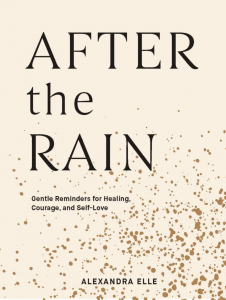
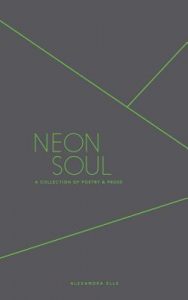
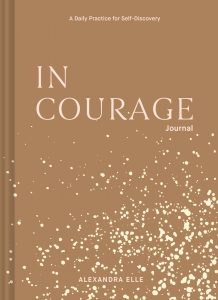
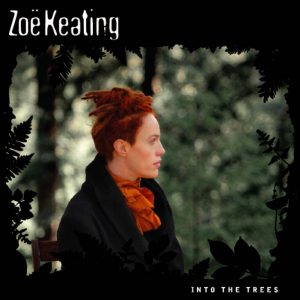


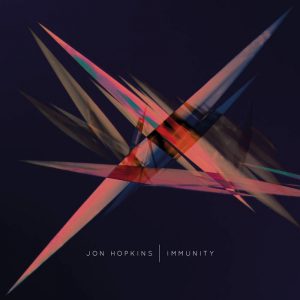
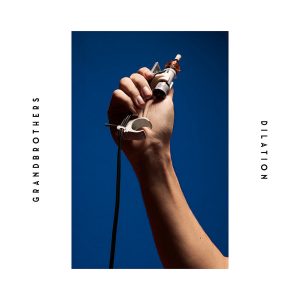
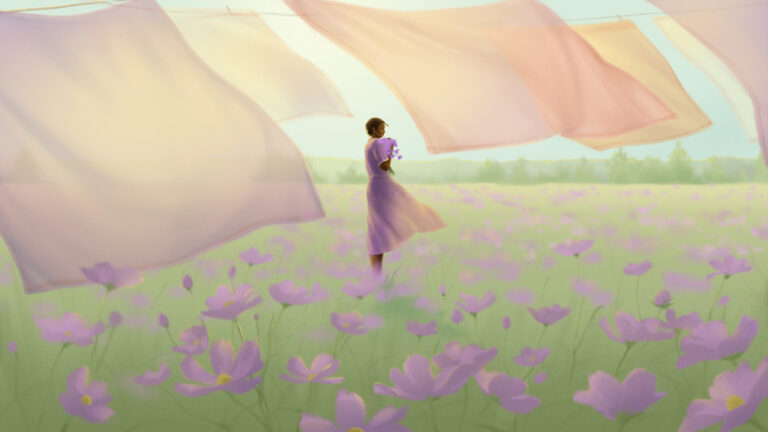
Reflections